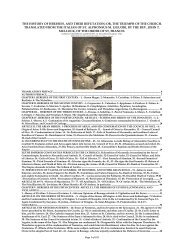The Writings of St. Francis of Assisi - + Saints' Works
The Writings of St. Francis of Assisi - + Saints' Works
The Writings of St. Francis of Assisi - + Saints' Works
You also want an ePaper? Increase the reach of your titles
YUMPU automatically turns print PDFs into web optimized ePapers that Google loves.
THE WRITINGS OF ST. FRANCIS OF ASSISI<br />
True God have and let there be rendered unto Him and let Him receive all honors and reverences,<br />
all praises and blessings, all thanks and glory, <strong>of</strong> whom is every good, who alone is good. (cf. Lk<br />
18:19).<br />
And when we ourselves see or hear (anyone) speaking or doing evil or blaspheming God,<br />
let us speak well and do good and praise God (cf. Rm 12:21), "who is blest throughout the ages"<br />
(Rm 1:25).<br />
Chapter XVIII<br />
How the ministers are to assemble together<br />
In any year whatsoever let the minister be able to assemble with his friars—wherever it<br />
has pleased them (to do so)—on the Feast 418 <strong>of</strong> Saint Michael the Archangel, to treat with those<br />
things which pertain to God. · For let all the ministers, who are overseas and beyond the Alps, 419<br />
once in three years, and the other ministers once a year, come to the Chapter at Pentecost at the<br />
Church <strong>of</strong> Saint Mary <strong>of</strong> the Portiuncula, 420 unless it has been ordained otherwise by the Minister<br />
and servant <strong>of</strong> the whole fraternity.<br />
Chapter XIX<br />
That the friars are to live as Catholics<br />
Let all the friars be Catholic, live and speak as Catholics. · If anyone indeed has<br />
wandered from the Faith and from Catholic life in what he has said or in what he has done and<br />
has not amended himself, let him be entirely expelled from our fraternity. · And let us regard all<br />
clerics and all religious as lords in those things which pertain to the salvation <strong>of</strong> the soul and do<br />
not deviate from our religion; 421 and let us venerate their state and <strong>of</strong>fice and ministry in the<br />
Lord.<br />
Chapter XX<br />
On (the Sacrament <strong>of</strong>) Penance and the reception <strong>of</strong> the Body and Blood <strong>of</strong> Our Lord Jesus<br />
Christ<br />
And let my blest friars, clerics as much as lay (brothers), confess their sins to the priests<br />
<strong>of</strong> our religion. · And if they have not been able (to do this), let them confess to other discrete<br />
and Catholic priests, knowing firmly and mindful, that from whatsoever Catholic priests they<br />
will have received Penance and absolution, they shall without doubt 422 be absolved from their<br />
418 September 29; the end <strong>of</strong> the year in the Medieval, agricultural calendar; for annual chapters<br />
see. fn. 321.<br />
419 i.e. at the time <strong>of</strong> this Rule's composition this would refer respectively to the Near East and to<br />
Northern and Western Europe.<br />
420 This little church, a mile south <strong>of</strong> <strong>Assisi</strong>, is where <strong>St</strong>. <strong>Francis</strong> was inspired to found the Order<br />
in 1208 A.D.; for triennial chapters see fn. 318.<br />
421 For the use <strong>of</strong> "religion" in this and the next paragraph, see fn. 156.<br />
422 <strong>The</strong> Latin phrase procul dubio translated here as "without doubt" means more precisely "far<br />
Page - 95













